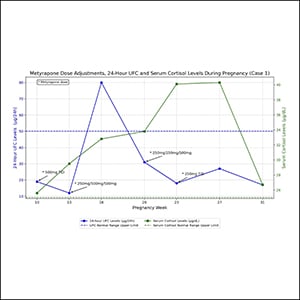Beverly MK Biller, Nidhi Garg, Susan J Mandel, Lara McHan, Angeliki Theodorou, Thomas J Weber
JCEM Case Reports, Volume 3, Issue 11, November 2025, luaf225
https://doi.org/10.1210/jcemcr/luaf225
Abstract
On July 14, 2025, the journal…

Beverly MK Biller, Nidhi Garg, Susan J Mandel, Lara McHan, Angeliki Theodorou, Thomas J Weber
JCEM Case Reports, Volume 3, Issue 11, November 2025, luaf225
https://doi.org/10.1210/jcemcr/luaf225
On July 14, 2025, the journal…


Cancer is a challenging enough diagnosis, but many patients are dealt a second blow, even as they heal: “chemo brain.”
Also called “brain fog,” this mix of cognitive issues — memory problems, struggling to find words, an inability…

Hello and welcome once again to the Pinsent Masons podcast where we try to keep you abreast of the most important developments in global business law every second Tuesday. My name’s Matthew Magee and I’m a journalist here at Pinsent Masons and this week we hear about the regulatory change that could lead to a flood of new, cheap biosimilar treatments and we look at the radical football regulation steps being taken in England.
But first, here’s some business law news from around the world.
Dutch privacy regulator sounds warning over LinkedIn AI plans.
Saudi Arabia enhances salary protection with unified employment contract and
HMRC finds value in big data after bringing in extra £4.6 billion.
The Dutch data privacy regulator has urged the country’s users of social media platform LinkedIn to disable AI settings to avoid their data being used to train AI models and it warned greater regulation could be coming after talks with other European data protection bodies. LinkedIn said it plans to start using public posts, comments and user profile data, including names, photos, roles and skills, for generative AI improvement from the 3rd of November and the regulator said it had extreme concerns over the fact that user data would be used by default, meaning users who didn’t want it to be used would have to choose to opt out of the process manually. The regulator’s vice chair, Monique Verdier, said “LinkedIn wants to use data dating back to 2003, while people shared that information at the time without foreseeing that they would be used for AI training,” she said. “That is why we call on everyone: adjust your settings before 3 November if you do not want data to be used for AI training.”
A major reform to labour laws in the Kingdom of Saudi Arabia will strengthen employee rights by introducing a new layer of legal accountability and help streamline wage dispute resolution, an expert has said. The country has launched an updated Unified Employment Contract, a new legally binding framework designed to strengthen contractual relationships and safeguard the rights of employers and employees, while allowing workers the opportunity to expedite the resolution of wage-related disputes. The changes will allow workers to bypass traditional labour dispute channels and file wage claims directly. Saudi Arabia-based employment expert Sairah Narmah-Alqasim said the new model will introduce new, significant compliance risks for employers. “Failure to pay wages, whether in full or in part, can now trigger direct enforcement proceedings, with only five days to respond once notified,” she said. “This effectively means that wage obligations are no longer just contractual, and that they are judicially binding.
Investigations based on UK tax authority HMRC’s big data system generated an extra £4.6 billion in tax in the last year, up more than one-third from the previous period. The Connect system uses data from a wide range of financial sources to analyse tax returns and detect potential evasion. In a Freedom of Information request to Pinsent Masons, HMRC confirmed that in the 2024–25 tax year it generated approximately £4.6 billion from Connect cases. Connect, which was introduced in 2010, has grown in scale over the last 15 years to become one of the largest data sets held by the UK government and is used by around 4,300 HMRC staff.
Biologics are a kind of medicine that work with your immune system to help deal with cancers and autoimmune diseases and just as you have branded pharmaceutical medicines and generics that copy them, so you have biosimilars, treatments that mimic the nature and effect of the original biologics.Even the biosimilar treatments can cost $100 million to develop, but changes in how they’re regulated could slash that cost by 70% with far-reaching consequences for the companies, National Health budgets and patients around the world. London-based life sciences expert Tracey Roberts has been looking ahead at the future of biosimilars. But first she told me a little more about the medicines themselves.
Tracey Roberts: Biosimilars are a type of a medicinal product and they are made using cells usually, so they’re proteins essentially. They’re quite clever because they’re biological materials and most of them are antibodies or antibody-type molecules and what that means is that they can target really specific areas of the body. So they’re really useful for things like cancer treatments, for instance, and autoimmune diseases. So that’s biologics generally. Now, biosimilars are copies of these biologic products. Your antibodies produced naturally by your own immune system and target usually external things like viruses or bacteria that come in. What these products are is they’re using that system, they’re kind of creating antibodies outside of your body. So you’re essentially injecting them in and they, in the same way that your natural antibodies would find a virus or would find a bacteria, they’re finding, they’re trained to find the cancer cell or cytokine, for instance, that’s causing this autoimmune response in the body.
These are products that are essentially copies of the biologic molecules. They therefore are sold at a cheaper price than the original product. So what they’re great for is starting competition in the market and lowering the price of these types of products.
Matthew Magee: Medicines are incredibly tightly regulated for very obvious reasons, and one big change is being made to how biosimilars are regulated. They already have a shortcut through pre-release processes because they’re based so closely on biologics that are already in use. But there’s still lots of testing, and this change is beginning to creep into how biosimilars are regulated and the steps that manufacturers have to take before putting them on the market.
Tracey: They have a shorter pathway if they can show that they are similar to that original biologic that’s on the market and they have to do that in a number of ways. There are sort of in vitro tests that they have to do. So they’re looking at their structure and their function and then in vitro tests in cells and then there are these phase three clinical efficacy trials and those involve the medicine being put into patients and there’s a comparison done between the originator biologic and the biosimilar product to show that it has similar characteristics in terms of its efficacy and its safety profile.
Matthew: It’s this third stage trial where the change is happening, with potentially enormous impact on the cost of bringing biosimilars to market.
Tracey: That final stage, those comparative efficacy trials or phase three trials where the drug is put into patients, it’s quite expensive to do, it’s quite time-consuming to do, it’s estimated that takes up about 70% of the cost of producing a biosimilar. So what the regulators are now doing, there’s a move towards removing these comparative efficacy trials, and there’s scientific support for doing that. So they looked at all of the biosimilars that had been approved to see whether any of them would not have been approved if you didn’t do these trials and they found that none of them except one would have got through. That was an old product and actually, based on new scientific experiments on the structure and function, actually it wouldn’t have got through some of the earlier phases and what they found is that actually there’s no scientifically sound basis for needing them, because if you can show that the biosimilar molecule is structurally and functionally the same, and you still do have to put it into healthy patients as part of the regulatory process, so you’re still going to put it into humans before it’s released onto the market, if you have all of that data, then effectively you can show that it’s biosimilar to the original product and so should be approved. Cutting out this sort of final stage, which requires patients, requires time, requires expense.
Matthew: Countries have their own medical regulators, but the cost of developing medicines is so huge that most companies won’t do it if they can’t sell in Europe and the US. So that gives EU’s FDA or Food and Drug Administration and the EU’s European Medicines Agency enormous indirect power. So if change is going to happen, it’s going to have to happen in Brussels and Washington. And those are the changes that Tracey has observed.
Tracey: At the FDA, we’ve seen the first molecule, pembrolizumab, which we’ve seen the FDA say will provide guidance that they’re not going to require the phase three trials and that was at the beginning of September. And then the European Medicines Agency has put out this consultation and the consultation was running until the 30th of September and it essentially was asking stakeholders to provide their views on whether they should also scrap comparative efficacy trials.
Matthew: In fact, the UK went first, removing the need for these trials in 2019, but it changed little because of the huge expense of drug development for that one single market.
Tracey: Whilst that was a really good step forward and the UK was really trying to lead the way, I think now that we’ve got this first product from the FDA where they’re saying they won’t need it, and we’ve got this consultation from the EMA, those big regulators are now following suit and what we’ll see now is that pharmaceutical companies will be able to come to market with a product for all of those markets, won’t carry out these trials, which is not something we’ve really seen since the MHRA made that change.
Matthew: The implications of this regulatory change are huge and will last for a long time. The medicines can take six to eight years to develop, so it won’t have an immediate effect on patients. But the behaviour of manufacturers, health bodies and investors will change much sooner than that, says Tracey.
Tracey: If this regulatory change goes through, what we will see is more biosimilars coming onto the market for a wider range of conditions. Where at the moment there’s just one product available, there now will be multiple products at a lower cost to healthcare providers and what that also means is in some countries, that means that the patients that have access to these treatments will broaden, because in some countries, they can only give it to the patients that have the very worst of the disease. They can’t afford to give it to everyone. So it will mean more patients get access because the biosimilar price decreases and also it means that there’s more money for those healthcare providers to reinvest back into other products. So I think biosimilar companies and manufacturers should go back and have a look at their portfolio and see whether there are any business cases that they maybe have dormant or where they wrote them off because they thought they were going to be too expensive and they should have a look at whether they could now bring that product to market because it looks like it’s going to be much cheaper to do that in the US and in Europe and then potentially rest of world down the track.
Football in England is big business. It’s top competition, the Premier League, is one of the richest and most watched in the world. This maybe makes it all the more surprising then that English football is embarking on something of a regulatory experiment. The leagues used to be largely responsible for the governance of the clubs in them, but those duties have now passed to a new independent football regulator in what sports law specialist Trevor Watkins says is the only one of its kind in a major footballing league. He told me what’s changing.
Trevor Watkins: For the last 25–30 years there’s been significant debate in English football over how it should be organised, how it should be governed and we’ve had numerous things, football task force, government intervention, football changing its rules, UEFA changing rules, FIFA changing rules and now politicians have had enough. They’ve decided that football has got things wrong about it, so they’ve decided to step in and the idea is that an independent regulator will in some way cure the ills that the government have seen. A lot of this is about wealth disparity, a perception that the money isn’t spread evenly across the game and also about fans and stakeholders ensuring their voice is heard. Whether that is what happens in the end is what remains to be seen because we’re in the early stages of this. Football’s not controlling its own destiny anymore. Until now, if you want to buy a football club, you go through tests that are administered by the leagues, by the Premier League and by the Football League depending on which club you’re buying. You also would have had the English Football Association involved in that process. Now it’s all over to an independent regulator. They’re also going to be looking at how sustainable your club is. You as an owner, do you have the money to make sure the club can meet its obligations? There’s still going to be rules that the leagues put in place as to how much money you might lose or make a season, but the regulator is going to be making sure that you can deliver. From time to time, politicians do try to influence the agenda, but we will be the only country with an independent regulator and the question then is, given the importance of sport and its economic interest to the United Kingdom, how will this affect Premier League and English Football League ownership?
Matthew: This takes decisions about the business of football, who owns and runs clubs, where the money comes from, where it goes, how the clubs conduct themselves off the pitch, squarely into the area of public law and away from the previous and more common sphere of self-regulation. This, says Trevor, will have consequences.
Trevor: So within football currently, and I’m not saying this is good or bad, if there is an issue, it’s usually determined by football processes. Tribunals, for example, we’ve done a huge amount of work recently on financial regulation representing clubs and club owners in their battles with leagues that seek to impose penalties on them and that’s an area that is tried and tested. There’s been changes to the rules over the years and that question of interpretation. But now the process is going to be determined for anything the regulator covers, the Competition Appeals Tribunal. So taking it really fairly and squarely into law and legal process outside of football rather than being determined from within football and I can see that creating a large number of discrepancies and there are more general considerations that the regulator is building into the rules that would suggest they would have more power and more ability to catch more people as being a breach of those regulations than not currently.
Matthew: This move into the public law sphere brings the regulation of football into line with the regulation of all sorts of areas of business, telecoms, say, or energy or broadcasting or financial services. So I put it to Trevor, why should football escape that independent scrutiny? Sport, says Trevor, who was once the chairman of a football club, is different and is recognised in law as being different.
Trevor: Because football, I would argue, is different. You know, I’ve always been a lawyer. But when I came into football in ’97, it opened up a whole different world for me of the way in which sport and sport is governed and operated and you know, European law, for example, has always acknowledged the specificity of sport. It’s always been acknowledged that certain practices within sport are anti-competitive but are necessary for the existence of that sport. I say good governance and good regulation is essential and I say it’s not as if the Premier League or the Football League have not been governing and doing a good job. So my question is why regulate and for what purpose? What is the ill that is looking to be cured by being regulated? Because there is a risk, and I think football needs to work very hard with the regulator to prevent this, of mission creep.
Matthew: It’s not clear what all the practical implications of these changes will be, but Trevor thinks that there’s a potential for effect on the value of clubs and even on their on-field performance.
Trevor: There’s a lot of scaremongering around values will drop. I think regulation is good and tends to ensure that a stable environment encourages investment. But there’s going to be some topsy-turvy times and some consequences, you know, and one of the powers of the regulator is intervention, which we haven’t had before. Effectively, if there are problems with the way a club’s being run, it will step in and, I guess at the very extreme, be able to sell a club. So that is a new power, and that’s a power that I would hope would be never wielded or at least only in extreme circumstances. But it represents a sea change and a sea change that could impact on the competitiveness of English clubs, particularly in European football.
Matthew: So what do clubs, investors and executives need to do now? Be vigilant and do everything they can to shape the next stage of football regulation, says Trevor.
Trevor: So one wonders exactly where we’ll end up with the regulator. I think that is the art of the detail over the next year and the important thing that whether you are an investor existing or intending, a funder existing or intending, or executive who is running a club or will be going into a club, this is the thing you really need to understand at the moment because football could sleepwalk itself into a situation where potentially more problems are created than solved. But there is obviously and genuinely a will to make things better and improve and I think to that end, that is really the action call is for stakeholders to really be in the detail of this and this is a great opportunity for football to get it right. Not being done elsewhere doesn’t mean it’s a bad idea, but it’s an idea that, with a healthy scepticism, needs just to be manoeuvred and directed so it’s a win-win for all concerned.
We appreciate every minute you spend with us, so thank you very much for listening again. Please do share this with anyone you think might be interested in a regular update and analysis on the worlds of business law and regulation. And remember, you can keep up anytime by reading the material produced by our team of reporters every day at pinsentmasons.com or once a week and personalised by signing up to the Pinsent Masons newsletter at pinsentmasons.com/newsletter. But until next time, thanks for listening and goodbye.
The Pinsent Masons Podcast was produced and presented by Matthew Magee for international professional services firm Pinsent Masons.
Every US$1 billion invested in renewable energy projected to generate US$1.41 billion in economic returns
(Jakarta) October 14, 2025 – Investing in clean energy and energy efficiency can power Indonesia’s twin goals: sustaining 8% annual GDP growth through 2029 and reaching net-zero emissions by 2060, finds a new study by WRI Indonesia.
Using an adaptation of the Indonesia Vision to 2045 (IV2045) model — an analytical tool that helps decision-makers see the economic, social and environmental impacts of policy choices — WRI researchers simulated what would happen if the country implemented the clean energy and energy efficiency measures laid out in Indonesia’s Comprehensive Investment and Policy Plan 2023 (CIPP).
The plan serves as Indonesia’s roadmap for transitioning away from coal under the Just Energy Transition Partnership (JETP), an agreement between Indonesia and international partners to support the country in making a fair and inclusive clean-energy shift. As Southeast Asia’s largest economy and one of the few developing countries in the G20, Indonesia’s energy transition carries both regional and global significance, as it can serve as a model for other emerging economies.
The study’s “JETP scenario” projects that new clean and efficient energy investments would drive 8% GDP growth while also reducing emissions. Power sector emissions are projected to peak at 324 million tonnes of carbon dioxide equivalent (MtCO₂e) in 2034 and then drop sharply to 13.2 MtCO₂e by 2050 — nearly six times lower than what emissions would be under a business-as-usual scenario — a reduction of more than 90%.
Crucially, the benefits go well beyond curbing emissions. The study also finds that:
“The study gives policymakers a strong case to act now on Indonesia’s just energy transition,” said Egi Suarga, Senior Manager for Climate, WRI Indonesia. “It shows that clean energy doesn’t impede prosperity — it drives it. Especially for emerging economies like Indonesia, it can create jobs, improve public health, reduce import dependence and build a more sustainable economy that works for everyone.”
To realize this potential, the study calls for rapid scaling of clean energy and energy efficiency, supported by ambitious policies, strategic partnerships and sustained investment. Priority actions include expanding renewable capacity to meet clean power targets, phasing out fossil fuel dependence, reforming subsidies, enforcing efficiency standards, and modernizing the grid to handle variable renewable generation.
The study also emphasizes the need for innovative financing — such as blended finance, green bonds and public–private partnerships — to attract large-scale private investment beyond the US$20 billion already pledged under the JETP. Ensuring a just transition through reskilling programs and social protections will be vital to support communities and workers as the country shifts away from fossil fuels.
These priorities should also be reflected in Indonesia’s upcoming update to its Nationally Determined Contribution (NDC), the country’s national climate commitment under the Paris Agreement.
The report underscores that Indonesia’s success in scaling renewables and phasing down coal could serve as a model for other emerging economies across Asia and beyond — showing that, with the right strategies and partnerships, rapid economic growth and decarbonization can advance together.
The full study and supporting data are available here.
Notes to Editors
About World Resources Institute
WRI is a trusted partner for change. Using research-based approaches, we work globally and in focus countries to meet people’s essential needs; to protect and restore nature; and to stabilize the climate and build resilient communities. We aim to fundamentally transform the way the world produces and uses food and energy and designs its cities to create a better future for all. Founded in 1982, WRI has nearly 2,000 staff around the world, with country offices in Brazil, China, Colombia, India, Indonesia, Mexico and the United States and regional offices in Africa and Europe.

Expand North Star 2025 has attracted the founders of 40 unicorn companies with a combined valuation of US$ 900 billion, reflecting the event’s significance among leading investors and entrepreneurs from around the world.
Organised by Dubai World Trade Centre and hosted by Dubai Chamber of Digital Economy, Expand North Star continues to attract global unicorn founders seeking to build strategic partnerships, explore the latest startup investment trends, and discuss financing opportunities. As the world’s largest gathering for startups and investors, the event serves as a vital international platform connecting venture capitalists and the digital innovation community.
During their participation, several unicorn founders highlighted the benefits of the UAE’s advanced business environment, which offers exceptional opportunities for the global growth and expansion of digital enterprises while fostering innovation across technology-driven sectors.
Andrew Feldman, CEO and Co-Founder of Cerebras Systems, an AI unicorn valued at US$ 8.1 billion, noted the strategic importance of the region, stating, “We have a big presence here in the United Arab Emirates. We’re already set up here and will be expanding over the next year. This is an extraordinarily exciting place to be doing business.”
This supportive environment is a major draw for new entrants. Pablo Zamora, Co-Founder of foodtech unicorn NotCo, which is valued at around US$ 1.7 billion, highlighted the investment potential created by this ecosystem. “You can see clearly the government support for startups to try to do a correct soft landing and giving the public and environmental support to have big business and scale it up correctly. As entrepreneurs, of course, we’re looking for investment and partnerships to open this region.”
The event’s global reach also provides a crucial gateway for companies looking to break out of their traditional markets. Tim Shi, Co-Founder of Cresta, a generative AI company from San Francisco, emphasised the value of accessing a new network: “We are based in San Francisco and meet a lot of US companies, but it’s just eye-opening to meet people from this part of the hemisphere.”
Expand North Star provides a dynamic platform to showcase cutting-edge innovations and enhance collaboration across the global tech ecosystem. The annual event represents a key pillar of Dubai Chamber of Digital Economy’s strategy to cement Dubai’s position as a leading global hub for innovation and technology.
This year’s edition is taking place at Dubai Harbour from 12-15 October 2025. For more information, please visit www.expandnorthstar.com.
